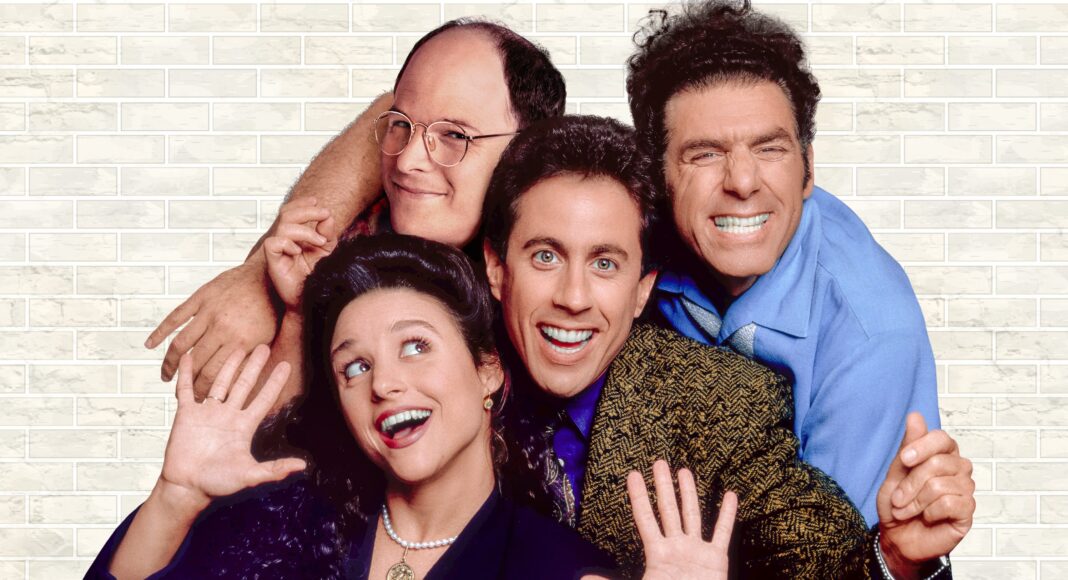For younger audiences who grew up cable-indifferent in the age of the streamer, a “throwback” show about self-consumed, social cue objectors ever on their noble path to nothingness should more than validate their own inner selves. So why don’t millennials and Gen-Zers understand “Seinfeld?”
Whether during the era in which it originally aired, in syndicated TV reruns, or at its latest home on Netflix, “Seinfeld” is a certifiable sitcom beast. But the “no hugging, no lessons learned” policy levied on-set by eventual “Curb Your Enthusiasm” star and “Seinfeld” co-creator Larry David befuddles the modern-day binge-watcher. Upon confronting their first serialized foray into the show that’s long eluded them, they are ashamed to learn, via the iconic ‘90s quartet, they too do not possess as much – or any – empathy as advertised.
Ironic, as these same viewers would not balk at their beloved “It’s Always Sunny in Philadelphia” deploying the same formula; nor forgo blocking out entire weekends to immerse themselves in Walter White’s “Breaking Bad” descent.
Interestingly, it’s joyously rooting for Jerry, George, Elaine and Kramer – cut to a laugh track twenty-somethings perhaps primarily associate with family-friendly “Nick at Nite” fodder – despite their amoral leanings that has the 2021 Johnny Dogooder the most mirror-fearsome.
The point of “Seinfeld,” and why it worked, was simple defiance. It’s not the equally mainstream “‘Friends’ with fewer weddings” that its newer audiences were anticipating after years of missed references running rampant past their heads. There was no mythologically charged connective tissue – save for a “Hello Newman” running utterance here, or an Elaine shove there – commanding “empathic” viewer engagement. By tackling the purely civilian misadventures of friends who liken themselves above pathology, humor was found in how beneath humanity they plummeted.
Explain that to the young adult comedy fan of today, overexposed to works that are only greenlit in the development phase if they have something of great substance to say about society.
What “Seinfeld” did, and still does well all these years later: it reels in the disillusioned malcontent in all of us, providing honest commentary on the world in ways its successors still fail to. When the jaded 9-to-5 worker bee turns on “Seinfeld,” they’re offered an instant, wish-fulfilling alternate reality more woven in theirs than any textbook definition of “fantasy.”
It does not ask you to rise above, rather find a select few who equally loathe social order; who don’t discourage, but hype you up when your next get-enlightened-quick scheme is napping under your desk at work, electing to bring Pepsi to dinner parties instead of wine, or screaming “Serenity Now!” to the metaphorical Heavens.
Millennials and Gen-Zers thought the advent of the “cringe comedy” belonged to them, had broken out with “The Office” and the subsequent testimonial-inclusive comedy takeover. When in reality, “Seinfeld” cornered the market, did so with the most basic, prestige-less format imaginable, and stands to once more. Because the thing about millennials and GenZers: they can’t leave a show uncompleted once started.
Here’s wishing them all the best on their journeys, as they hold out hope for Jerry and Elaine to finally profess their love for one another in the finale. Surely “Seinfeld” won’t double down on its reprehensible, but otherwise delightful power four who can’t seem to shake their shortcomings. After all, everything I know about Seinfeld the man from scrolling down the recommended videos on my Facebook feed and perusing the comments section of clips featuring his stand-up suggests he is a shockingly clean comic. Therefore, I’ve been conditioned to assume he falls to the lighthearted extreme. An endearing optimistic. Dare I say? A 1990s Ted Lasso!
About that…





